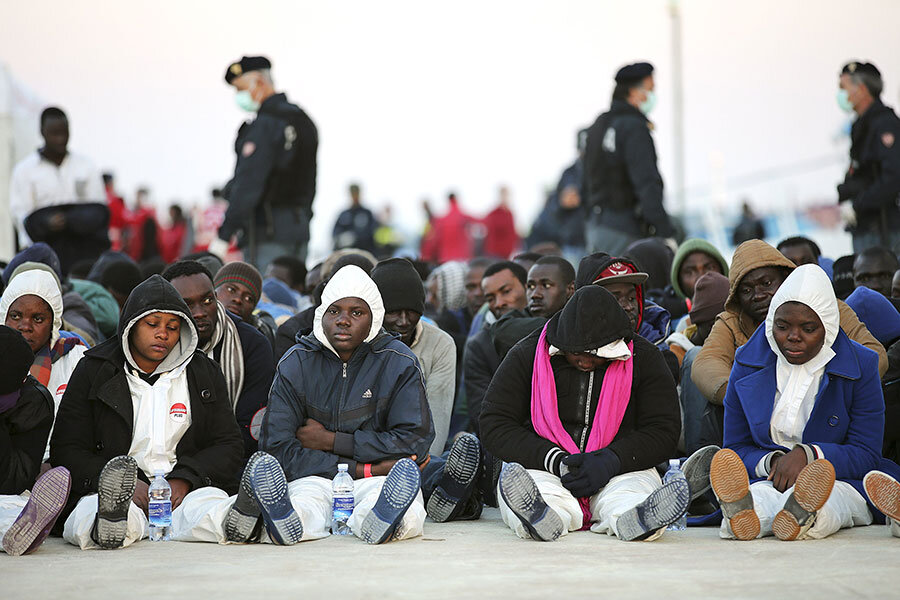Europe dithers in face of unprecedented wave of migrants
Loading...
| Brussels
An unprecedented wave of migrants has headed for the European Union's promised shores over the past week, with 10,000 people making the trip. Hundreds – nobody knows how many – have disappeared into the warming waters of the Mediterranean, including 41 migrants reported dead Thursday after a shipwreck.
Amid these scenes of desperation, none of the 28 nations from the world's wealthiest trade bloc has pledged a single ship, a single plane, or a single cent to add to the rescue efforts. With the spring crossing season kicking off, the EU has no relevant legislation in the works, and no emergency meeting on the agenda.
Instead, the EU says it will unveil a migration agenda for discussions by the end of May and draw up a report by Christmas.
The most visible action has come from aid group Doctors Without Borders, which pledged to put medical workers on board a rescue ship beginning in May.
"We are acutely aware that we are only one boat," said Hernan del Valle, the group's head of humanitarian affairs. "It's a tragedy that Europe has turned its back on this problem."
The EU acknowledges it doesn't have a plan for the humanitarian catastrophe. There is no appetite to launch an emergency operation, like Italy did in 2013-14 when migrants started drowning in big numbers.
"We do not have a silver bullet," EU migration spokeswoman Natasha Bertaud said Thursday, citing political and financial constraints. "The European Commission alone cannot do it all."
The 28 EU nations have long argued about how to share the burden that migration places on the continent. Italy, Greece, and tiny Malta are bearing the brunt of the influx. Germany and Sweden are accepting large numbers of asylum seekers.
Other countries are doing less. Many EU nations are mired in economic crisis, facing a growing anti-foreigner electorate at home and an increasing bent to look inward instead of out to the wider world.
The EU's own institutions, so often the first target of scorn, are hamstrung unless the member nations agree that forceful action should be taken.
That leaves migrants and asylum seekers – driven chiefly by poverty and conflict – on their own.
On Tuesday, survivors of a capsizing told the aid group Save the Children that some 400 of their shipmates were missing. On Thursday, the International Organization for Migrants said 41 more were feared drowned in another shipwreck, citing four survivors rescued by a helicopter after four days adrift at sea.
The EU's top migration official, Dimitris Avramopoulos, said such events are "unfortunately the new norm and we will need to adjust our responses accordingly."
According to the UN's refugee agency, 219,000 refugees and migrants crossed the Mediterranean last year, and at least 3,500 died trying. The numbers crossing in the first two months of 2015 were already up by a third over the same span the previous year, according to the EU's Frontex border agency.
Many migrants pay thousands of euros to be shoe-horned by smugglers onto old boats and rafts on the coast of conflict-torn Libya and pointed toward Europe. If they are rescued, the EU lets them stay while their cases are assessed – by which time many have settled in Europe.
The EU has of course spent money on defending its borders – it spends 90 million euros ($96 million) a year on its Frontex border agency, whose widely criticized Operation Triton program is designed to control the EU's territorial waters, not to rescue people. Unlike Italy's Mare Nostrum program, which was closed last year because it was expensive and politically unpopular, Triton does not patrol close to the Libyan coast to pick up migrants in need.
Today, other than the Italian, Greek, and Maltese coast guards, only three aircraft and six ships from European nations are patrolling the Mediterranean.
The EU has limited its response to providing opportunities for migrants who want to come legally, including better protection for refugees, special permits for certain kinds of migrants, and steps to thwart smugglers.
EU interior ministers agreed last month that Frontex should be beefed up. Yet nobody came forward with a firm offer to contribute.
The discussions continue – but they are slow. After a report that the European Parliament says will be ready by Christmas, the policy discussions will certainly still be going this time next year.
"We managed politically and on the ground to almost eradicate piracy off the Somali coast," said Roberta Metsola, an EU lawmaker from Malta. "Can we not see what resources we have ... get to the Mediterranean and use those resources to save lives?"







